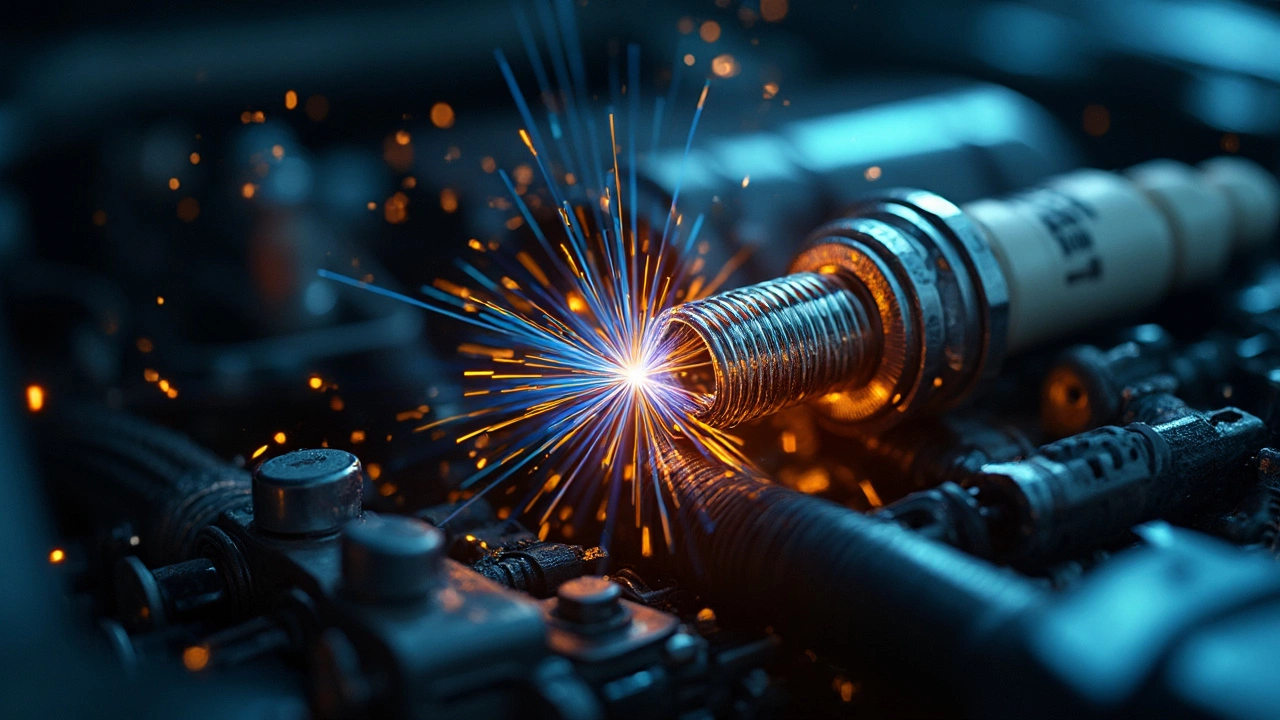Alright, let's get straight to it: can a car run without spark plugs? Sounds a bit like asking if a smartphone can work without its battery, doesn't it? Spark plugs are a main player in the starting lineup of your car's engine. They might be small, but they pack a punch when it comes to firing up your vehicle.
Here's the deal: spark plugs ignite the air-fuel mixture in your engine's cylinders. This explosion is what gets the pistons moving, basically bringing your engine to life. So, without spark plugs, your ride won't even start. Imagine trying to start a bonfire with wet matches—good luck with that!
But what if these little guys run into trouble? Maybe they're worn out or just not doing their job right. Well, your car's not going to be happy about it. You might notice rough idling, trouble starting, or even crazy fuel consumption. And trust me, that's when you want to get things checked out before you end up on the side of the road figuring out how to explain your adventure to the tow truck operator.
- Understanding Spark Plugs
- The Role in Engine Performance
- Signs of Faulty Spark Plugs
- Can an Engine Run Without Them?
- Tips for Spark Plug Maintenance
Understanding Spark Plugs
Alright, let's take a closer look at these little marvels called spark plugs. They're tiny, but man, do they have a big job! Made up of a central electrode, a ground electrode, and an insulator, a spark plug sits at the heart of your engine, literally sparking things up.
What's Inside a Spark Plug?
The central electrode is where the magic happens. When the ignition switch is turned, an electrical charge jumps from the central electrode to the ground electrode, creating a spark. This spark ignites the air-fuel mixture, causing an explosion that pushes the pistons down, spinning the crankshaft, and ultimately, getting your car moving.
At the top of the spark plug is the terminal where it connects to the ignition coil. The materials used for the electrodes, like platinum or iridium, are durable to handle high temperatures and voltage.
Types of Spark Plugs
You've got different types of spark plugs, and your car might need a specific kind to run at its best. The main ones you'll hear about are copper, platinum, and iridium spark plugs. Copper is the old-school type, while platinum and iridium tend to last longer due to their stronger materials.
| Type | Lifespan |
|---|---|
| Copper | 20,000 miles |
| Platinum | 60,000 miles |
| Iridium | 100,000 miles |
It's worth checking your vehicle's manual or asking your mechanic for the lowdown on which plug type suits your car best.
Why Care About Spark Plugs?
Without these bad boys, your car isn't going anywhere. They're crucial for maintaining your car’s engine performance and keeping your fuel consumption in check. Healthy spark plugs mean smoother starts, better acceleration, and healthier emissions.
So there you go, spark plugs might be small and often overlooked, but they're essential for the joy of driving. Keep an eye on them and ensure they're in good nick—you'll thank yourself later when your car purrs like a kitten instead of acting like a grumpy old dog.
The Role in Engine Performance
Let's talk about why spark plugs matter so much to your engine's mojo. The basic job of a spark plug is to ignite the air-fuel mixture in your engine's cylinders. This ignition is crucial for creating the mini-explosions required to turn your engine's pistons and get your vehicle moving.
The Ignition Process
Imagine your car engine performing like a mini rock concert. Spark plugs are like the pyrotechnics—getting things lit (literally) and exciting. Every time a spark plug fires, it creates a tiny electrical arc that ignites the mixture of air and fuel. Without this action, your engine would be as lively as a deflated balloon.
When spark plugs function properly, they help in delivering better engine performance, smoother starts, and optimal fuel efficiency. But when they're not working right, you'll notice a drop in performance like your playlists losing their bass. This means sluggish acceleration, more fuel consumption, and an engine that just feels off.
Maximizing Power and Efficiency
The thing about spark plugs is that they play a big part in keeping your engine's efficiency in check. For instance, spark plugs have heat ranges, which is basically how hot they get to burn off carbon deposits. Getting the right range for your specific vehicle can increase power output and conserve fuel.
Common Misfires and Issues
Now, nobody wants to deal with misfires. It's when one or more cylinders fail to fire properly. This can cause a list of symptoms, from annoying engine vibrations to a downright unexpected stall. Dirty or worn-out spark plugs are often the culprits here.
So next time your car maintenance checklist comes up, give those spark plugs some love. Swapping old ones for new can make a world of difference, and your car will thank you with fewer struggles and better fuel economy.

Signs of Faulty Spark Plugs
You might be wondering how to tell if your spark plugs are acting up before you're left stranded. There are some pretty telltale signs that can save you the hassle if you're paying attention.
Poor Fuel Economy
If you're visiting the petrol station more often than usual, your engine performance might be suffering from faulty spark plugs. Worn-out plugs can lead to incomplete fuel combustion, meaning you're burning more fuel than necessary. Keep an eye on your mileage, as a sudden drop typically points to an issue.
Engine Misfiring
Feeling jerky or rough when you accelerate? That's called engine misfiring. It often happens when a plug fails to ignite the fuel mixture in the cylinder as it should. According to automotive expert Mike Allen, "Misfiring can be like a sneeze. One mistimed moment can throw off the whole system."
Misfiring can be like a sneeze. One mistimed moment can throw off the whole system.
So, if your car feels like it's got a hitch in its step, your plugs might be the culprits.
Hard Starts
Ever found yourself turning the ignition key a tad longer than feels comfortable? Spark plugs play a vital role in starting the engine. They need a strong spark to begin combustion. If weak or worn, the car struggles to start, signaling it's time for a replacement.
Engine Idling Roughly
Your car engine should hum along smoothly, even when idling. If it's vibrating or shaking, don't ignore it. Rough idling often results from spark plugs that can't deliver smooth ignition due to wear and tear or carbon buildup.
Table: Common Spark Plug Issues and Symptoms
| Issue | Symptom |
|---|---|
| Worn Electrodes | Reduced mileage, engine misfire |
| Carbon Build-up | Rough idling, poor acceleration |
| Cracked Porcelain | Starting issues, misfire under load |
Recognizing these signs early on can save you a big headache and keep your car running efficiently. Remember, keeping up with regular car maintenance is key to avoiding trouble down the line.
Can an Engine Run Without Them?
Right off the bat, let's make it clear: your car's engine needs those spark plugs to work, plain and simple. Without them, it's like trying to start a fire with an empty lighter. Spark plugs create that crucial spark to ignite the air-fuel mix in your engine. No spark means no combustion, and no combustion means you're not going anywhere.
Think of these tiny components as the heartbeat of your engine. They're responsible for delivering the right jolt at just the right moment to keep your engine purring smoothly. Take them away, and well, you might as well be trying to drive a garden shed.
"A healthy engine relies on efficient spark plugs to maintain consistent performance. Their absence renders any modern internal combustion engine useless," says auto industry expert James K. Whittaker.
So, can an engine technically run without them? No, it won't. The car engine's design assumes that these sparks are consistent. Miss just one, and it's like missing a step on a ladder—you might not notice it immediately, but it could lead to a nasty fall.
DIY Tips to Avoid Spark Plug Issues
- Check your spark plugs regularly. It could save you loads of hassle later on.
- Use the right type of spark plugs recommended by your car's manufacturer.
- Look out for symptoms like misfires or rough idling, which could be signs of faulty plugs.
Keeping your spark plugs in check means keeping your car maintenance on track. A small investment of time in checking them could have you avoiding a world of engine trouble down the line.

Tips for Spark Plug Maintenance
Keeping those spark plugs in tip-top shape isn't rocket science, but it's an essential part of car maintenance that can save you from bigger headaches down the road. Let's break down a few easy tips to keep your spark plugs firing perfectly.
Regular Inspection
The first line of defense is giving your spark plugs a once-over now and then. A visual check can reveal a lot about their current status. Look for signs of wear or deposits on the plug tips. A little bit of gunk can mean it's time for a swap.
Replacing at the Right Time
Replacement intervals can vary depending on your car's make and model, but a common rule of thumb is around every 30,000 to 50,000 miles. Check your vehicle's manual for specifics because sticking to that schedule can keep your engine performance smooth.
Use Quality Parts
When it's time to replace, don't skimp on quality. Cheap plugs can end up costing you more in the long run with frequent changes and potential engine issues. Original parts or recommended brands are usually a safer bet.
Proper Installation
Believe it or not, spark plugs have a sweet spot when it comes to how tight they need to be. In other words, you don't want them too loose or cranked too tight. Follow the torque specifications in your owner's manual to ensure you're getting it just right.
Mind the Gaps
Spark plug gaps refer to the space between the electrode and the ground electrode. A little off in the gap, and your engine might misfire. Invest in a gap tool, and check if it's consistent with the manufacturer’s recommendations whenever you install new plugs.
Keeping your spark plugs in good shape isn't just about saving money—it's about making sure your engine enjoys a long, happy life. So, next time you're under the hood, give those guys some love!

